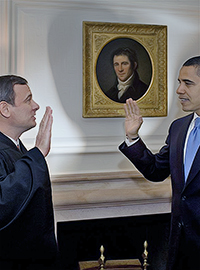| Is John Roberts Listening to Jonathan Gruber? |
 |
|
By Ashton Ellis
Thursday, November 20 2014 |
Is John Roberts listening to Jonathan Gruber? In a move that stunned Republicans and Democrats alike two years ago, Roberts, the U.S. Supreme Court Chief Justice, changed his mind and single-handedly rewrote ObamaCare in NFIB v. Sebelius to save it from its own unconstitutionality. A key ingredient in Roberts’ judicial about-face was his ability to overlook the law’s (erroneous) reliance on Congress’ power to regulate interstate commerce, and instead relocate the relevant authority to its power to tax. To do this, Roberts had to tell himself that Congress didn’t mean what it said in its own statute. And all this despite specific and repeated public statements by President Barack Obama that the individual mandate is in no way a tax. With another ObamaCare challenge headed to the Supreme Court next spring, will Roberts revert to form? The challengers in King v. Burwell are asking the Court to honor the plain meaning of ObamaCare’s text and prohibit the IRS from issuing federal subsidies to people buying insurance policies through Healthcare.gov, the federal exchange. According to the words in the statute, only consumers purchasing insurance through a state-operated exchange are eligible for financial assistance. In King as well as two other federal lawsuits, the Obama administration argues that the intent of ObamaCare is to provide subsidies to everyone, regardless of what the text actually says. Or as Democratic political operative Donna Brazile helpfully summarizes: "'Affordable' is in the name – as in the 'Affordable Care Act.'" This is a useful point only if declaring something affordable requires every branch of government to make it so. The disputed statutory language has been described as a "typo" and "complex," a problem easily fixed by a liberal judicial reading that allows the IRS to interpret the law as it sees fit. No doubt that’s the kind of reading MIT Professor Jonathan Gruber would like to see from Chief Justice Roberts. Gruber is the health policy expert now infamous for several video clips of him calling American voters "stupid”"and repeatedly admitting that he helped ObamaCare's authors "torture" the law's text in order to deceive the public. In one particularly brazen diatribe Gruber says ObamaCare "was written in a tortured way to make sure CBO did not score the [individual] mandate as taxes," because, "if CBO scored the mandate as taxes, the bill dies." But while Gruber’s comments about hiding the truth of ObamaCare from voters and even the Congressional Budget Office confirm conservative suspicions about lack of integrity and abuse of process, other Gruber comments bear directly on the King v. Burwell challenge. Back in 2012, Gruber said that ObamaCare was written in a way to force states to build their own health insurance exchanges or risk losing millions in subsidies for their citizens to buy health care. As Gruber stated, "I hope that’s a blatant enough political reality that states will get their act together and realize there are billions of dollars at stake here in setting up these Exchanges, and that they’ll do it. But you know, once again, the politics can get ugly around this." Yes they can. No one knows how Chief Justice Roberts will cast his vote when the Supreme Court gets down to deciding what to do with the King case. At least one conservative writer thinks Roberts is owed an apology for his earlier opinion because, according to Gruber’s confession, the individual mandate was – functionally if not textually – a tax. In this reading, Roberts correctly looked beyond the text to get at what the law actually did. But therein lies the problem. If Roberts was willing to go outside the text of ObamaCare to save it from challenge, it seems more likely he would do the same here and let the IRS interpret its subsidy scheme as it sees fit. That may be a bridge too far, even for the Chief Justice. It would require him to bless a bureaucratic override of a clear statutory command. In his recorded statements, Jonathan Gruber is telling John Roberts and anyone else with five minutes and an Internet connection that ObamaCare deserves to be held to the letter of the law. Hopefully, the Chief Justice is listening. |
Related Articles : |
























